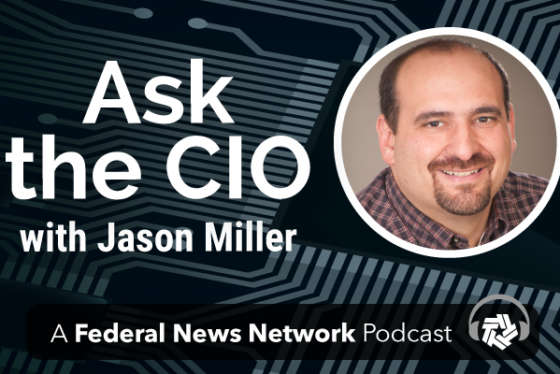Office space consolidation inspires HHS IT upgrades
Frank Baitman, the Department of Health and Human Services chief information officer, said moving to an open office floor plan drives the agency to be more mobile...
HHS CIO Frank Baitman recently joined Federal News Radio for a free Ask the CIO online chat. View an archive of the chat now.
The Department of Health and Human Services is joining a growing list of agencies that are moving off the venerable Blackberry.
HHS foresees several benefits in using a different brand of smartphone, but a main reason is the office space consolidation the department is going through later this year.
Frank Baitman, the HHS chief information officer, said his office will follow the lead of the General Services Administration by creating an open floor plan where employees will not have desks or phones and instead be mobile workers.
“We are taking the CIO staff from multiple buildings spread across D.C. and Maryland and consolidating the CIO folks into a wing of the [HHS headquarters] Humphrey building,” he said. “We are going to take one wing of the third floor and move the OCIO into open spaces. There will be no private offices.”
Baitman said his office has to build a technology environment that is “high touch and collaborative” to support this new open space plan.
“Ultimately, I want to get to a point where it doesn’t matter whether you’ve chosen to come into the office or you are working at a Starbucks or working from home, but you are part of the conversation on any particular project that you are involved in,” he said. “The space we are putting together here, though, is going to promote a couple of our key initiatives. We often say our goal in 2015 is the 3 ‘Cs,’ collaboration, communication and consolidation. The consolidation is enabling the other two.”
Faster to the cloud
The move to iPhones will help in meeting those three Cs as well.
Baitman said there are about 5,000 employees in the Office of the Secretary that have government-furnished mobile devices.
“The fact we are starting with one [type], doesn’t mean we will end with one. But the issues are both a security and cost issue,” he said. “From a security standpoint, there is a lot of benefit to the iOS platform because it’s locked down, and there is a lot of benefit to having one platform. It costs us a great deal more money to manage a second and third. That being said, I’m one who really believes in platform diversity so I’m hoping that the vendor community finds ways to minimize the costs of moving beyond a single platform, and gives us mobile device managers that are platform independent, and the Android community does a great job of beginning to build standards so there aren’t so many differences between their hardware.”
The move to Apple and the office space consolidation can happen because HHS is quickening its pace to move applications to the cloud.
Baitman said cloud services are more mature than a few years ago, and the security process called the Federal Risk Authorization Management Program (FedRAMP) is making a huge difference. In fact, HHS approved Amazon, Verizon/Terremark and Salesforce clouds to be secure under the FedRAMP standards using the agency process versus relying on the program’s Joint Authorization Board (JAB).
“We actually recently completed a contract with Microsoft to bring Office 365 in, and we are in the process of rolling out email-as-a-service, first in the Office of the Secretary, and it will soon be followed by moving to other operating divisions, including Centers for Medicare and Medicaid Services and Food and Drug Administration soon thereafter,” he said. “We are rolling it out first in the Office of the Secretary to identify any of the issues that might or inevitable will come up. It will roll out across the entire enterprise. Part of that has been the Office of Management and Budget’s insistence that we do it as a single instance across the entire HHS enterprise, and that’s what we intend on doing.”
Train cyber experts
The email-as-a-service, mobility and space consolidation are three of Baitman’s top 10 IT initiatives for 2015.
He said there are plenty of other things HHS needs to work on, but having at least 10 major projects keeps employees from being overwhelmed.
A fourth major focus area for HHS is around its workforce.
Baitman said his office is piloting an approach to hire and retain cybersecurity experts.
“We decided we would benefit by creating clear career paths for cybersecurity professionals so when you come in as a GS-11 and you know what interests you, we ensure you move along on that career path to get the training you need so that you don’t have to leave government and go to industry to advance your skills,” he said. “What we are doing is developing a clear career path with all the associated things necessary to retain, reward and make our cybersecurity professionals excited by their jobs because they are having a huge impact across HHS. What we are going to do with that program once we finish it this year is expand it beyond my cybersecurity team to the entire department’s cybersecurity workforce. Then we will look at picking that up and see what from this program can we mimic and apply it to other IT disciplines to address the same challenges we have across IT with recruiting and retaining great IT talent to the federal government.”
RELATED STORIES:
GSA declares end to cube farms, unveils new approach to office space
HHS pacing its move to the cloud
CIO Council to try to deepen the pool of IT workers
Copyright © 2025 Federal News Network. All rights reserved. This website is not intended for users located within the European Economic Area.
Jason Miller is executive editor of Federal News Network and directs news coverage on the people, policy and programs of the federal government.
Follow @jmillerWFED







